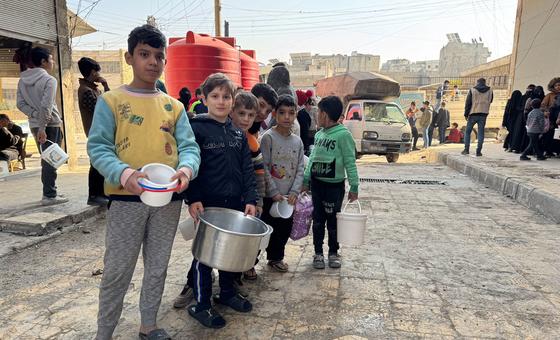
UN Spokesperson Stéphane Dujarric told reporters at the daily briefing on Thursday that bakeries in Aleppo are at near full capacity – “but partners report that they have seen long queues and crowding.”
The UN aid coordination office, OCHA, reports that the rehabilitation of key facilities has begun in the northwest of Syria – the first area to fall to opposition fighters on the road to Damascus from their powerbase around Idlib – including hospitals in Homs and road repairs in Aleppo.
Water supplies have been fully restored in Aleppo following a six-day suspension, thanks to help from aid workers with UN Children’s Fund (UNICEF), and the International Committee of the Red Cross (ICRC).
The UN relief chief Tom Fletcher is now in Türkiye after visiting many areas across Syria earlier in the week.
Mr. Fletcher met families in Idlib on Wednesday “who voiced their need for immediate services and for the rehabilitation of their homes and land before they could return to their places of origin,” said Mr. Dujarric.
Unexploded ordnance poses a major risk to civilians, including children, said OCHA chief Fletcher, and must be cleared as a priority.
“We and our partners are responding as security and logistical conditions permit,” the UN Spokesperson added.
Since 27 November, more than 1.3 million people have received food aid across the country, including hot meals. However, the rapid devaluation of the Syrian currency is impacting food availability.
Healthcare challenges
In Hama, 30 health facilities remain non-functional while in northeast Syria, 14 health facilities continue to be suspended due to reports of vandalism, looting, and lack of access.
Other health facilities maintain only basic services due to severe shortages of pharmaceuticals and medical supplies, Mr. Dujarric said, “making a horrific situation even worse for the 44,000 displaced people in that region.”
Humanitarians said evacuation orders by the Israeli army have triggered displacements in southern Syria.
OCHA repeated that those fleeing fighting must be allowed to do so safely and return voluntarily when the situation allows.
Villages ‘completely empty’
Many of Syria’s villages, towns and cities are almost empty and uninhabitable after 14 years of war, UNICEF said on Thursday.
Following a three-day assessment mission to Damascus, Homs, Hama and Aleppo, the UN agency’s Ammar Ammar told UN News’s Daniel Johnson in an exclusive interview, that the international community needs to provide rapid support for Syria, so that children and their families can return safely to their former homes:
Deputy Special Envoy for Syria, Najat Rochdi, engaged in a virtual townhall with over 200 young Syrians on Wednesday, half of whom were women – from Syria and the diaspora.
The event highlighted the critical role that young people will play in Syria’s transition, focusing on their aspirations and their concerns for the future, said the UN Spokesperson.
Torture expert raises alarm
Meanwhile, the UN independent rights expert – or Special Rapporteur – on torture, Alice Jill Edwards, has raised the alarm about the potential loss of crucial evidence of torture in Syria.
As families search desperately for their missing loved ones, Ms. Edwards published a position paper on Thursday relevant to the International Court of Justice’s (ICJ) upcoming case against Syria. This paper documents extensive allegations of torture and inhuman treatment since the civil war began in 2011.
Ms. Edwards highlighted severe abuses under the Assad regime, including beatings, electric shocks, and sexual torture. She emphasized the systemic nature of these crimes, with reports from infamous prisons like Sednaya. The lack of basic necessities and medical care has exacerbated the suffering.
Ms. Edwards called for justice and rehabilitation for victims, stressing the need for an independent body to investigate these crimes. She also warned about the contamination of crime scenes, which could hinder future prosecutions. The full position paper is available for review.
The Special Rapporteur’s position paper is available here.
